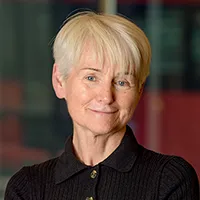
What inspired you to first enter higher education?
On leaving school, I actually went straight into the world of work. In the community I grew up in, staying on for A levels was considered a bit reckless and a university degree surplus to required economic and social capital.
Landing a civil service training post at 18 with the Inland Revenue as a trainee Senior Executive Officer was considered a real success; a secure job which in those days, would last until retirement. Life sorted! I was posted to the Belfast City Centre Enquiry Counter to help people with questions on pay and tax. Friday afternoons were challenging as the workers from Harland and Wolff shipyards (all men) arrived at the counter, many after a drink or two, to raise issues about their weekly pay and had often worked up a head of steam on their queries.
Other days the job involved explaining to retired taxpayers why their savings and pensions were being taxed. This was the generation that experienced the pressures of paying for health care, and secondary education, and subsequently embraced the post-war welfare state. Working across the decades, saving, and paying tax, retirement seemed to bring yet more tax and they wanted to know why.
This ‘school of life’ taught me about the pain, perils, and passions of those living on low levels of weekly salaries or pensions which took them just over the benefit lines; households in which every pound made a difference.
This was also the time of The Troubles, and along with just about everyone else, we were out on bomb scares weekly, experienced two explosions in our building (we had been evacuated) and were also taken hostage at one point when gun men jumped over the counter; political queries rather than taxation. It was frankly a crazy time and the song We Gotta Get out of this Place by The Animals became a bit of an anthem. By 21, I had got out as far as a local university to study social policy and nurture my fascination with society, inequalities, government and the everyday implications for various communities and families. Further, we were entering an era of European Studies and that meant a lot for Irish and British identities too. That said, any settlement to The Troubles, centuries old, seemed far off.
So what inspired you to remain in academia?
The fascination with social issues and challenges, of how personal experiences and the political intertwine, had me hooked. After completing my first-degree final exams during the hunger strike ensured I left Ireland for a Masters in Public Policy at Bath, studying industrial development in the north and south of Ireland. I became a migrant and never went back to live. My world opened in wonderous and challenging ways. At that time there was a lot of direct and unconscious bias towards the Irish. Further, I found it hard to understand how life evolved in somewhat idyllic ways in parts of England. During this time I learned to explore the values of people and work to connect accordingly; appreciate difference and get to know the person. Ph.D. work followed with a period at EUI in Firenze and then Durham University. At the same time, I was now a single mother and the seeming control over time in academia, along with the potential to research issues of relevance to societal change, drew me in.
As I submitted my Ph.D, I was fortunate to receive my first ESRC grant to study the update on cervical screening among south Asian communities in Teesside. It was incredible to work with women, community groups, local health care professionals and policy makers to address a complex and sensitive issue. Across the decades I studiously avoided any senior leadership roles, preferring to focus on teaching and research. Then I was asked at short notice to step in as Director of Research. I realised that, through this role, I could help to enhance the research culture and processes by offering the user perspective, engaging researchers and exploring ways in which that virtuous circle of education and research might be realised. Suddenly leadership offered opportunities.
Across my working life I’ve been driven by key social problems, evidence gathering, ensuring people are involved in these processes, and on their terms, plus working across groups / partnerships. In recent years, my career has moved in ways I’d never anticipated and I’m learning all the time about the relationship between academe and the wider public and government, working life in general, and ways in which we can promote research to underpin education for our successors.